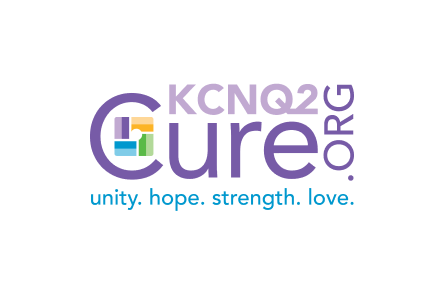KCNQ2 Cure Alliance
Cycle 3
Mutations in the KCNQ2 gene are responsible for a spectrum of neonatal-onset epilepsy syndromes, encompassing both severe early-onset epilepsies known as developmental and epileptic encephalopathies (DEEs), as well as milder forms referred to as self-limited (benign) neonatal epilepsies. The impact of these genetic variations can vary widely, leading to diverse symptoms and varying degrees of disorder severity based on the specific type of KCNQ2-related epilepsy an individual has.
Last updated 04/30/2025
Clinical
Disease Class
Channelopathies
Body Systems
Nervous / Sensory
Organs
Brain
Known Genetic Link
Yes, one or more genes directly cause the condition
causative_genes
KCNQ2
contributory_genes
None specified / unknown
Type of Inheritance
Autosomal dominant
De novo
Newborn Screening
No
Disease Mechanism(s)
Abnormal channel conductance
Abnormal channel regulation
Altered channel kinetics
Ion channel dysfunction
Pathogenic mutation
Age of Onset
Early childhood (age 1+-5)
Infancy (age 0-1)
Prebirth
Average Age at Diagnosis
Adolescence (12-17)
Early childhood (age 1+-5)
Infancy (age 0-1)
Middle childhood (6-11)
Life Expectancy
Adolescence (12-17)
Adulthood (age 18-64)
Early childhood (age 1+-5)
Infancy (age 0-1)
Middle childhood (6-11)
Affected Sex(es)
Female
Male
National Prevalence
1001-10000
Global Prevalence
1001-10000
National Incidence
Less than 10
Global Incidence
Less than 10
Symptoms / Phenotypes
autism
autistic behavior
behavioral changes
cognitive impairment / confusion / brain fog
feeding difficulties
gastrointestinal disorders
hypotonia
movement disorders / ataxia / tremor
seizures / epilepsy
speech problems / apraxia
vision problems
Biomarkers
Diagnostic
· EEG
Monitoring
· EEG
Other
Prognostic
· EEG
Therapeutic
· EEG, Mutation Type and Location
Existing Therapies
Other
· anti-seizure medications and drugs approved for other symptoms
Organizational & Research
Cell Lines
iPSCs
Cell Lines, Institution
Boston Children's Hospital
Northwestern University
University of Antwerp
Cell Lines, Involvement
Consulted
Funded
Cell Lines, share
Unsure
Disease Model
Mouse
Disease Model, Involvement
Consulted
Designed
Funded
Disease Model, share
Some of our disease models are freely available
Clinical Trial Role
Data sharing
Focus group
Recruitment and outreach, patients
Study material design, review (not protocol)
Study protocol design, review
Biobank, Institution
COMBINEDBrain
Biobank, Involvement
Funded
Center of Excellence, Institution
None
Registry
No, we do not have a registry, but we plan to create one
Natural History Study
Yes, we have collaborated on a natural history study
Data Collected, Natural History Study
Genetic data
Platform, Natural History Study
REDCap
FDA Patient Listening Session
Yes
FDA Patient-Focused Drug Development (PFDD) Program
No
ICD Codes
We are working on obtaining an ICD-11 code
Yes, we have an ICD-10 code specific to our exact disease
Diagnostic Guidelines
No
Science Advisory Board Policies
Yes, willing to share SAB policies
Research Network Policies
Does not have a CRN
Research Roadmap
We don't have a Research Roadmap
International Chapters
Oceania
International Partners
Europe
